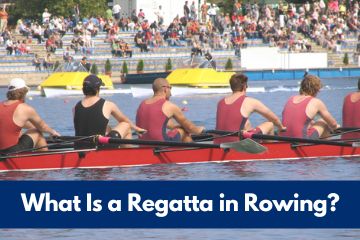
The word Regatta is such a pretty-sounding word, isn’t it?
I remember as a very young child thinking that a regatta was a collection of flags for some reason, and it is, in one manner of thinking.
The Cambridge university dictionary says that a regatta is a sport consisting of boat races. The word regatta comes to us from the Venetian word regata meaning “contest” and typically describes racing events of rowed or sail-powered boats.
This doesn’t mean that racing boats with engines can’t be called regattas. When you think of the word regatta, think of boat races of all kinds, and you can’t go wrong!
My name is Petra, and in this article, I want to address beginners who want to learn more about regattas in rowing competitions.
Why Do They Call It a Regatta?
As I mentioned earlier, the Venetians called their boat races a regata (spelled slightly differently) because the word means contest.
Perhaps the Venetians didn’t have any other word in the 1500s for racing or rowing competitions or even water sporting events.
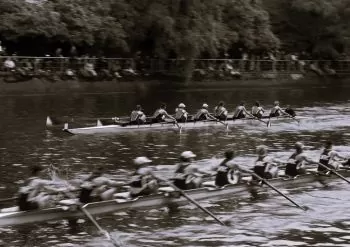
Calling competitive rowing a contest seems appropriate, don’t you think?
The Venetians used to race gondolas, which aren’t that different from today’s row boats, and while I’m not sure that the regattas of old were the all-day events they are now, they still involved racing teams on the open water, so calling it a contest makes perfect sense.
What Happens During a Regatta?
Remember when I said that as a very young child I thought regatta meant flags?
The reason for this is most likely because I was brought to regattas when I was an infant. Although I was too young to understand what was happening, I probably noticed the parade of flags that occurred before the races begin.
All boats will parade around with their flags flying high before they separate into their appropriate class groups.
Perhaps the most popular regatta is the famous Henley Royal Regatta which takes place on the River Thames.
It feels as though half of the world attend this regatta, even those who may not really be interested in the races, but those who are more interested in watching the variety of boats that will sail by, not only to strut their stuff but to show support for a particular team.
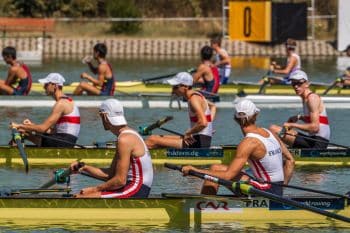
A regatta can be a one-day event (and I mean from sunup to sundown), or it can even take place over several days, or even a week!
While the procession of historical and other boats pass by, the teams prepare their shells and get in position for the races that will follow the boat parade.
Each regatta has slightly different rules, but most open regattas post a racing order list that tells everyone when they can expect to race.
Some regattas let youngsters go first, others have junior members go last, and others save the “big” race, usually college races, for last.
Even if your team is not scheduled until the end of the day, you are still expected to show up early and be a part of the spectators or help out with other chores, such as fundraising for your club.
Spectators can watch from boats that are safely parked out of the way, or they can watch from shore.
Money, gold or silver cups, trophies, and more are generally awarded at an after-regatta dinner or party.
- Related Post: Rowing Race Distances and Times
What Is the Difference between a Regatta and Head Races?
You will often see a rowing competition described as being a regatta or a head race.
What is the difference?
Regattas have dozens of different races going on. You can have 1,000-meter competitions between women in their 60s and later have a 500-meter competition between 16-year-olds.
Head races, however, involve a single race but on a much longer course.
Most regattas involve races somewhere between 500 and 2,000 meters.
Head racing involves a 3-4 mile course that generally includes obstacles.
Regattas allow for a wide range of competitive rowing classes, but most head races do not.
While each head race has its own set of rules, many require that your team has won some sort of championship, 3 years out of the last 5 years.
International competitions are frequently seen when speaking of head racing, while regattas don’t often have international participation.
Can Anyone Join a Regatta?
This will depend on the rules of the regatta.
Most local or club run regattas will allow anyone to join. Don’t be surprised to see advertisements for a local regatta searching for more competition!
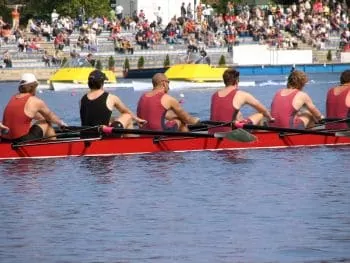
It’s not uncommon to see clubs from various cities around the state or even out of state competitors join a regatta held by a local club.
While these may not be longer races like head racing, they are still all-day events that usually welcome the public to view the rowing competition as well.
Other regattas, such as Olympic tryouts (see our list of famous rowers), college regattas, or other private yacht clubs may restrict who they want to allow to participate.
If you would like to join or race in a regatta that you’ve heard of, search for the list of rules. You can almost always find these published online.
The Bottom Line
In the majority of cases, a regatta is a set of competitive rowing races that involve multiple classes of people.
Head races are the same, but they involve longer distances and smaller groups or classes.
If you plan on attending a regatta, make it a weekend event, not just a few hours. You’ll be glad you took the time to enjoy every aspect of this exciting sport.
Enjoy the regattas!
Written by Petra Amara – RowingCrazy.com
CEO & Founder of RowingCrazy, National Rower, Coxswain Womens Eight Team, Rowing Coach & Writer
Petra is a Mother of two and owner of Rowingcrazy.com. Petra lives and breathes rowing, she also has a passion for writing which lead her to start RowingCrazy.com to share her rowing experience and expertise with others.



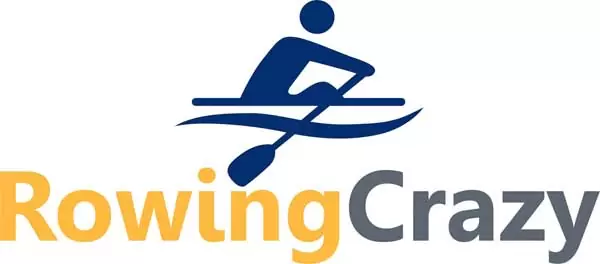


Pingback: Your Complete Guide to Rowing Age Categories | Rowing Crazy
Pingback: Famous Rowers: Olympians, Celebrities & Much More!